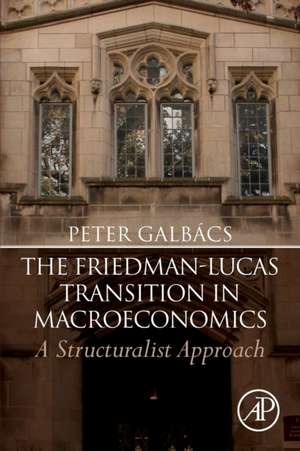The Friedman-Lucas Transition in Macroeconomics: A Structuralist Approach
Autor Peter Galbácsen Limba Engleză Paperback – 18 feb 2020
- Offers a wide selection of Robert Lucas’s unpublished works
- Discusses the history of business-cycle theories in the context of methodological advancements
- Suggests effective arguments for emphasizing the key role of representative agents and their assumed properties in macro-modeling
Preț: 470.99 lei
Preț vechi: 735.68 lei
-36% Nou
Puncte Express: 706
Preț estimativ în valută:
90.13€ • 92.98$ • 75.21£
90.13€ • 92.98$ • 75.21£
Carte tipărită la comandă
Livrare economică 19 martie-02 aprilie
Preluare comenzi: 021 569.72.76
Specificații
ISBN-13: 9780128165652
ISBN-10: 0128165650
Pagini: 396
Dimensiuni: 152 x 229 mm
Greutate: 0.53 kg
Editura: ELSEVIER SCIENCE
ISBN-10: 0128165650
Pagini: 396
Dimensiuni: 152 x 229 mm
Greutate: 0.53 kg
Editura: ELSEVIER SCIENCE
Public țintă
Upper-division undergraduates, graduate students, researchers, and professionals concerned with business cycles, especially in macroeconomicsCuprins
1. Methodology…?! Why?2. Standing on the edge: Lucas in the Chicago tradition3. Agents and structures4. Realism and instrumentalism along the Friedman-Lucas transition5. The end of economics?
Recenzii
"Peter Galbács has spent almost a year reading and analyzing my work on economics, partly in Chicago where we talked frequently. He also spent time at Duke University, where my manuscripts are archived. Peter has thoroughly diagnosed my work and my relationship to a wide range of other writers. An interesting and unusual book indeed!" --Robert E. Lucas, Jr., The John Dewey Distinguished Service Professor Emeritus in Economics and the College, The University of Chicago
"In this provocative work, Galbács presents the history of macroeconomics as featuring a profound transition from instrumentalism, in Friedman, to a form of realism, in Lucas. Unflinchingly, he confronts deep questions of how models represent the world. Employing the notion of ‘semirealism’, he offers a stirring account of macro-phenomena in terms of their causal foundations." --Anjan Chakravartty, Appignani Foundation Professor, University of Miami
"In this provocative work, Galbács presents the history of macroeconomics as featuring a profound transition from instrumentalism, in Friedman, to a form of realism, in Lucas. Unflinchingly, he confronts deep questions of how models represent the world. Employing the notion of ‘semirealism’, he offers a stirring account of macro-phenomena in terms of their causal foundations." --Anjan Chakravartty, Appignani Foundation Professor, University of Miami
